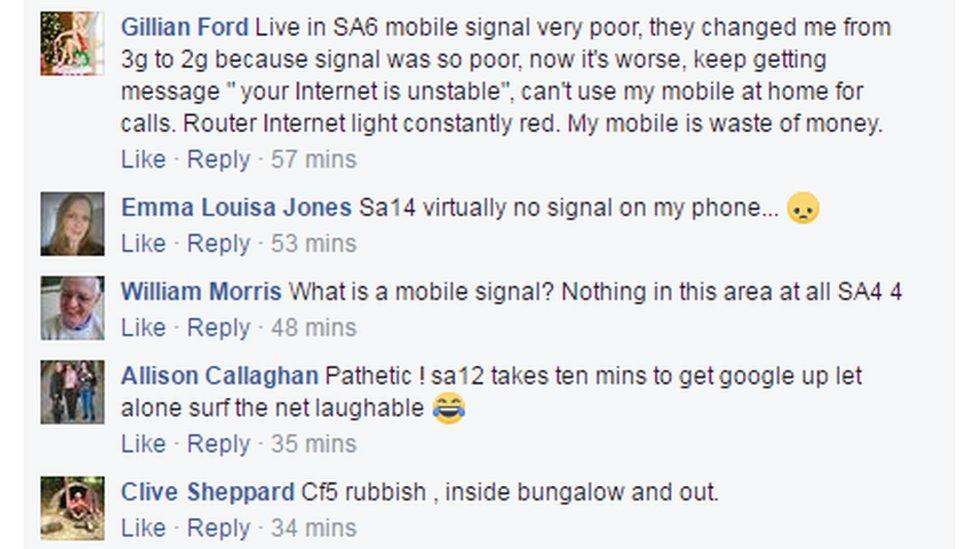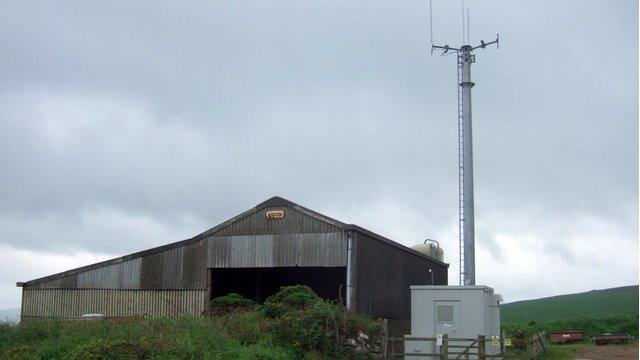Wales 'behind England' on tackling mobile 'not-spots'
- Published

Wales is lagging behind England in plugging mobile phone "not-spots" by easing restrictions on taller masts, the UK government has claimed.
England now allows masts up to 25m (82ft) without a full planning process, but the limit in Wales is 15m (50ft).
Welsh Secretary Alun Cairns said he was "disappointed" that Wales was "following, instead of leading".
The Welsh Government said it would look at the evidence before deciding whether to relax restrictions.
Applications for masts can be fast-tracked under what are known as permitted development rights.
In March, the UK government announced plans to raise the maximum height for such masts in England, external from 15m to 25m, or 20m (66ft) in protected areas such as national parks.
Welsh ministers have commissioned research into raising the limits on the permitted development rights to the higher English levels, with taller masts allowing coverage over a wider area.
It expects to receive the findings by summer 2017 and will consult on any changes after that.
Alun Cairns says there is 'no practical reason' for Wales to lag behind
Mr Cairns said it was "a positive step, but I do think it's quite late".
"I fear that Wales could be maybe up to 12 months behind England again, and that is for no practical reason," he told BBC Wales.
It was "simply unacceptable that Wales doesn't have the same efficient network of connections that other parts of the UK have", the Vale of Glamorgan MP added.
Mr Cairns said he had been told that the planning regime in Wales was "not as straightforward as it is in England in getting low masts up to the sorts of heights they need in order to achieve longer distances, longer reach and to come over the mountainous terrain that we have".
Telecoms companies would spend their budgets in England instead of Wales if it meant they could reach more customers, he claimed.
Regulator Ofcom has said that 12% of Wales is considered to be in a "not-spot", with no signal at all - the UK figure is 10%.
Poor mobile phone signal is frustrating for customers, pub landlord Hefin Evans said
Hefin Evans, a pub landlord in Talgarreg, Ceredigion, said lack of coverage was bad for business, especially for his bed and breakfast and holiday cottage rentals.
"It's one of the most frustrating things," he said.
"We've tried many times on different items and none seem to work at all.
"The frustration is getting to the customers, and also it's a loss of income for us.
"When people come to see them, they do like the cottages, and then they suddenly find out there is no mobile phone reception.
"You can see their faces, and the scene alters immediately."
Rhodri Williams, Ofcom director for Wales, said the nation had been "lagging behind since the advent of the technology".
"It is getting better, but it's getting better everywhere else as well," he told BBC Radio Wales' Good Morning Wales programme.
"The root cause of this is the fact that our geography, the hills and mountains here in Wales, make it more difficult, make it more costly."
Mr Williams added: "There are some masts in Sweden and Finland that are 100m and more, as we have for television and radio.
"Nobody seems to object to them," he said, "but we've even had campaigns in some parts of the country not to have mobile masts put up."

Mobile phone users have been sharing their views of network coverage in Wales via Facebook, external.
Gillian Ford, from Swansea, claimed the mobile signal in the SA6 postcode area was "very poor".
"They changed me from 3G to 2G because signal was so poor, now it's worse", she wrote.
"My mobile is waste of money."
Neil Rogers, who lives in the Caerphilly area, said his signal had never been the best but claimed it had got worse since his provider upgraded the service to 4G.
In a statement, the Welsh Government said: "We are taking a responsible approach on this issue.
"We feel it is essential to obtain robust, reliable evidence to support any changes we may make on permitted development rights and telecommunications.
"We need to make sure the evidence addresses the specific circumstances and topography found in Wales.
"We will be commissioning research in the new year, which will examine the relevant information and make recommendations on the changes to permitted development rights that we may need to make."
There have been calls to allow customers to roam between networks in parts of the UK with poor reception, as they can do overseas.
Mr Cairns said the UK government would "happily look at any calls" to extend network coverage.
- Published5 October 2016

- Published19 July 2016

- Published23 March 2016

- Published27 September 2016
